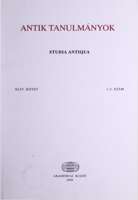
We kindly inform you that, as long as the subject affiliation of our 300.000+ articles is in progress, you might get unsufficient or no results on your third level or second level search. In this case, please broaden your search criteria.

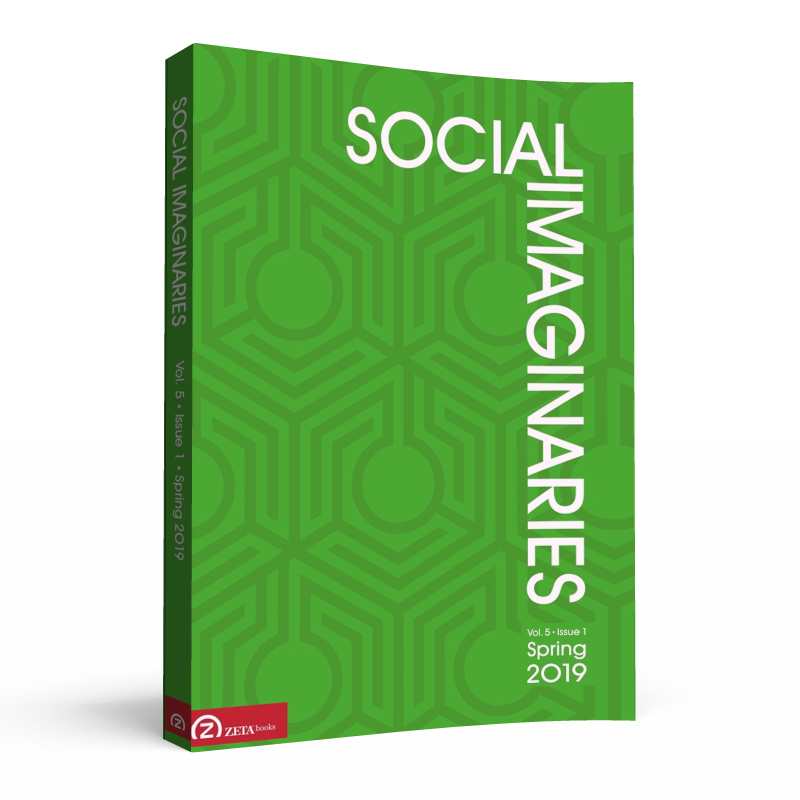
This essay raises the question of the character and status of imagination in ancient Greek philosophy. It is often said that neither Plato nor Aristotle conceived of imagination in genuinely productive terms. The point, however, is not approaching ancient thought while thinking with Kant, as if we were looking for proto-Kantian insights in antiquity. Ancient thought is not a series of ‘tentative steps’ destined to reach a full-blown articulation in modernity, let alone an anticipation of the first critique. On the contrary, it is essential to acknowledge the discontinuities that make the ancient discourse remote and, in many respects, opaque, hidden from us. On the ground of such assumptions, the essay addresses the understanding of imagination (eikasia, phantasia) in the Greek context, focusing in particular on Plato’s Timaeus. First, we consider how imagination, precisely in its creative aspect, operates at the very heart of philosophical argumentation. Plato’s emphatic awareness of this disallows the rhetoric of philosophy as the discipline of truth (of apodictic necessity, objectivity, and neutrality). In fact, it calls for a profound re-thinking of the relation between creativity and the philosophical turn to the ‘things themselves’. Timaeus imagines the cosmos as a theatrical device: the place of seeing and being seen, of contemplation and the originary emergence of images. This evokes an understanding of imagination outside the order of subjectivity and its faculties, i.e., a meditation on the impersonal character of production and the force of images (of symbols) arising without being constituted by ‘me’.
More...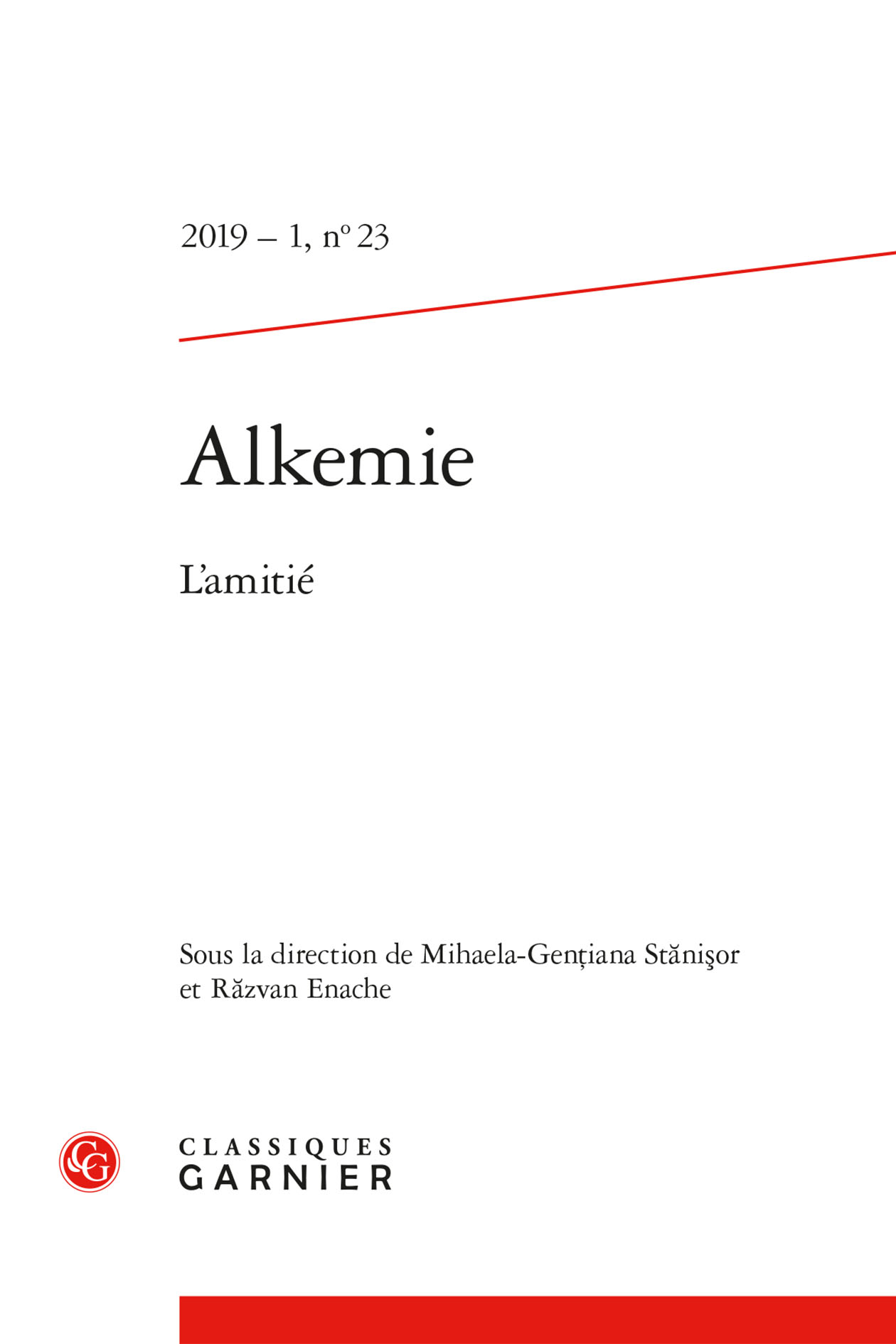
La tradition philosophique a sans cesse cherché à définir ce que devait être l’amitié – idée, concept, type de comportement, vertu. Dès le début, chez Platon, toutes ces tentatives ont forcé l’amitié à entrer dans une comparaison avec la sympathie, l’amour ou le bien suprême. Mais toutes ont négligé ses rapports véritables à la temporalité. // The philosophical tradition has always tried to define what “friendship” actually should be: an idea, a concept, a kind of behaviour or a virtue. Since the beginning in Plato all these attempts constrained friendship in a comparison with sympathy, love or the primordial good. But all neglected its very relations with time.
More...
Dans les dernières années de sa vie, Michel Foucault a développé le concept de l’éthique du souci de soi, qui s’appuie sur la culture de soi et sur le rapport à l’autrui, qui constitue une source de renouvellement et de démultiplication de l’être. Or, pour celui qui s’inscrit dans ce processus, la philia aristotélicienne, fondée sur la réciprocité et l’égalité, constitue un modus operandi particulièrement pertinent au service du projet foucaldien de réalisation de soi. // In the last years of his life, Michel Foucault developed the concept of the ethics of self-care, which is based on self-cultivation and on the relationship to others, which is a source of renewal and multiplication of being. However, for those who are part of this process, the Aristotelian philia, based on reciprocity and equality, is a particularly relevant modus operandi for the Foucaldian project of self-realization.
More...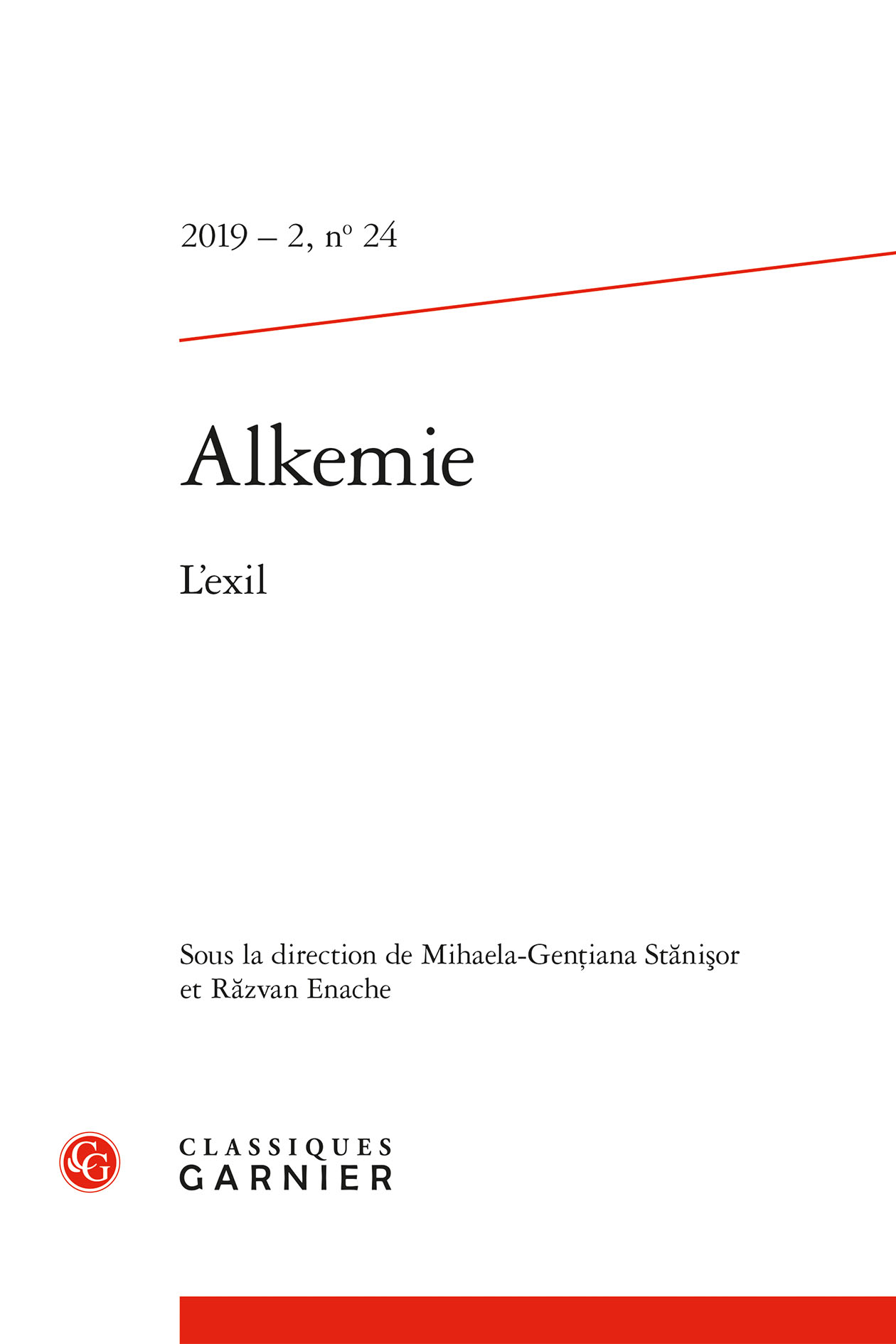
Dans l’Antiquité, l’exil était considéré comme le pire des maux! Et cela est vrai, si l’on considère à juste titre que le sol natal constitue la référence suprême. Pourtant, la notion d’exil prend aussi beaucoup d’autres sens en dehors du strict sol d’un pays. Parce que chaque être, au-delà d’un pays, est un monde, et que le cerveau, cet endroit le plus sacré du monde, crée ses propres voyages, ses propres sorties de soi, ces différents états de conscience qui sont exils et retours. // Since antiquity the exile was considered the worst of states. And that is true since we take the place of birth as a supreme reference. However, the concept of exile assumes many other meanings besides leaving the place of birth. Each being is a world in itself and the brain, this most sacred realm of the world, creates its own voyages, its own detachment, as different states of consciousness resulting from exiles and returns.
More...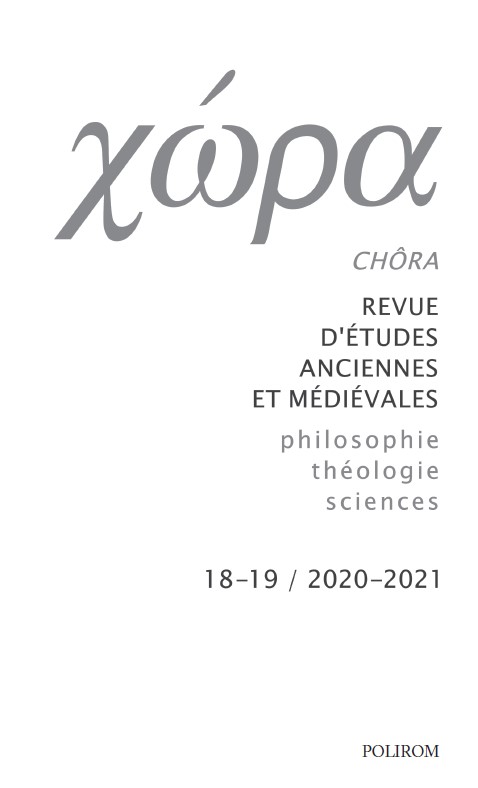
Review of: Gweltaz Guyomarc’h - David Lefebvre, Dynamis. Sens et genèse de la notion aristotélicienne de puissance, Paris, Vrin («Bibliothèque d’histoire de la philosophie»), 2018
More...
This essay raises the question of the character and status of imagination in ancient Greek philosophy. It is often said that neither Plato nor Aristotle conceived of imagination in genuinely productive terms. The point, however, is not approaching ancient thought while thinking with Kant, as if we were looking for proto-Kantian insights in antiquity. Ancient thought is not a series of ‘tentative steps’ destined to reach a full-blown articulation in modernity, let alone an anticipation of the first critique. On the contrary, it is essential to acknowledge the discontinuities that make the ancient discourse remote and, in many respects, opaque, hidden from us. On the ground of such assumptions, the essay addresses the understanding of imagination (eikasia, phantasia) in the Greek context, focusing in particular on Plato’s Timaeus. First, we consider how imagination, precisely in its creative aspect, operates at the very heart of philosophical argumentation. Plato’s emphatic awareness of this disallows the rhetoric of philosophy as the discipline of truth (of apodictic necessity, objectivity, and neutrality). In fact, it calls for a profound re-thinking of the relation between creativity and the philosophical turn to the ‘things themselves.’ Timaeus imagines the cosmos as a theatrical device: the place of seeing and being seen, of contemplation and the originary emergence of images. This evokes an understanding of imagination outside the order of subjectivity and its faculties, i.e., a meditation on the impersonal character of production and the force of images (of symbols) arising without being constituted by ‘me.’
More...
If there is widespread disagreement in an intellectual community, are its members in some sense failing epistemically? In this paper, I will offer a reconstruction of the first sustained attempt to answer this question. The attempt is made in the Alcibiades, a dialogue attributed to Plato. There, Socrates argues that the disagreeing parties lack knowledge. I will offer a reconstruction of this argument. Socrates relies on a controversial premiss according to which systematic and persistent disagreement within a group is an indication that its individual members lack knowledge. This claim rests on an optimistic assumption, explicit in the Alcibiades, that a person who possesses knowledge in a domain is able to persuade the audience and bring it to an agreement with the speaker. Knowledge, if present, spreads within the community unobstructed.
More...
The sociological approach to the concept of creativity lacks some accuracy, since it is addressed from an a priori perspective and admitted without reflecting on what it means socially and culturally. In this connection, the present article tries to provide a specific description of the term from its genealogy and on the basis of the socio-cultural-historical context where it arises. More precisely, it deals with the idea conveyed by western myths, the narrative about the identification of the instituting generatrix forces or the procreative divinities that lie behind the birth of the cosmos, of the world, of society, of the earth, of gods, of humans, of animals, and of plants. Thus, from an interpretative examination of the myths about Mother Goddess, those about Biblical Genesis, as well as of Greek creation myths, an attempt will be made to draw a conceptual map that delimits the most defining features of creativity (1). The ultimate goal is to check whether such characters have survived to the present day (2).
More...
As metaphysics of al-Fārābī and Ibn Sīnā are directly inspired by Aristotle’s Metaphysics, especially by book Γ 1003a in which the Philosopher stresses that the subject of this science in being as such, but also by Α, 1, 981b; Α, 2, 982b where he clearly says that the science is about fisrt causes, it is not surprising that we can see some evident similarities between the teachings of these two great Muslim philosophers. Still, if we analyse their works we can notice various modifications by Ibn Sīnā, which are causing certain discrepancies between him and al-Fārābī (as in Kitāb al-Mabda’ wa’l-Ma’ād, already researched by Yahya Michot (2004/2005)). Differences and modifications are numerous. However, in this article I intend to highlight the main focus of their metaphysical teachings. The focus is mainly directed towards their understanding of existence, relation between necessity and contingency, as well as towards their understanding of metaphysics as science of being qua being in general. I this article I intend to show how Ibn Sīnā’s metaphysical system represents an important step forward in comparison to al-Fārābī’s view.
More...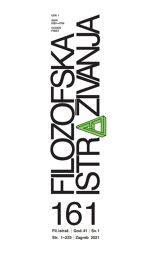
The paper discusses certain aspects of Buddha’s and Confucius’ philosophy that could be relevant for the general philosophical discussion on the problem of freedom, free action and related philosophical themes. Although their philosophical thinking was shaped in a rather different linguistic, cultural and philosophical milieu and background, both thinkers are in agreement at least twofold. Firstly, the possibility of freedom and free action is not opposed to the natural order of things, quite contrary, it is enabled by this order. Secondly, this possibility is being realised through never-ending self-cultivation and attunement to the world as it is. In the context of contemporary discussions on the problem of the relationship between free will and determinism, it could hence be said that both thinkers are on the position of “compatibilism”, nay, on the position that free action is possible only in the context of (soft) determinism that sees nature (or the world) as ever-changing and conditioning circumstances and “patterns”, and not bound to strict (mechanical) and linear deterministic causality.
More...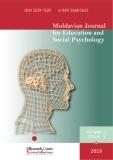
The story of „The Ship of Theseus” lay at the foundation of one of the most intriguing paradox of any perspective of ego, self and identity. In this article, the story is told and retold in many different ways. Broadly, the story has three narrators: Plutarch (who fueled at least six variations and another three competitors of the main theme), Thomas Hobbes (whose readings of the story ignited the search for solutions to this paradox – solutions that are mainly logical) and I, Gabriel R. Suciu: my version shifts the question from „How to present the paradox?” and „How to solve the paradox?”, to „How to build a paradox?”. It’s worth mentioning that a fourth version is also told, at the beginning of the article – the story told by the ship itself.
More...
The aim of the article is to outline the main characteristics of the connection between Martin Heidegger’s thought and Aristotle’s philosophy. Heidegger finds in Aristotle’s texts the example of presence as the thinking of unconcealment. The structure of the argument between Aristotle and Antifon becomes the paradigm for the argumentative relation between the conceptions of Heidegger and René Descartes. Both the destiny of Being which has now been revealed via Cartesian philosophy and the possibility of the new thinking of Being is derived from the philosophy of Aristotle, to wit – from the twofold possibility of reading its structure. The new thinking of Being is linked precisely to the thinking of presence as unconcealment, which coincides with the eigentlich Being. The relation of Heideggerian-Aristotelian philosophy to the Cartesian paradigm is understood via the structure of the Greek distinction between alētheia and pseudos.
More...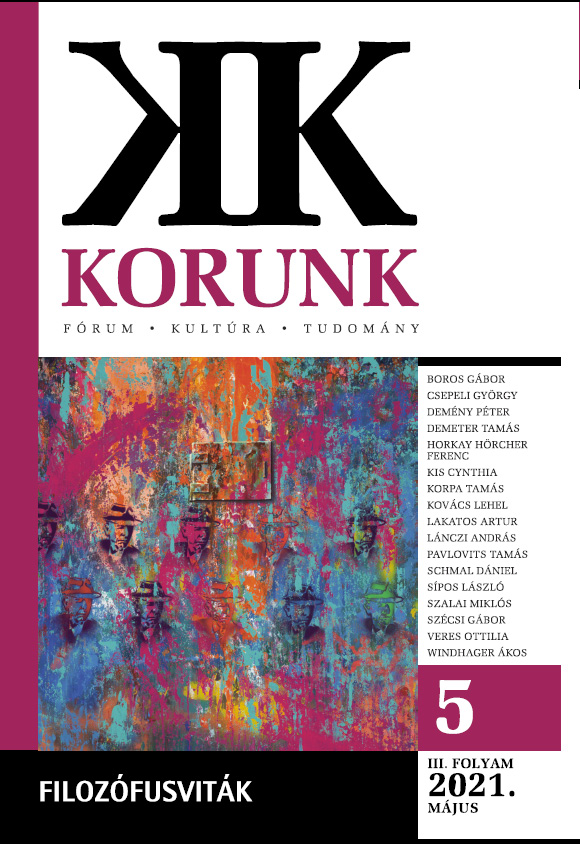
This paper offers an overview of the way the literary genres of dialogue and debate see the history of Western philosophy through. It starts out from Plato’s astonishing use of the dialogue form to recall the teachings of his master, Socrates, without ever relating it to his own way of thinking. Plato’s debate with poets, rhetors and sophists is the other pillar of the narrative, showing that, from its starting moment, Western philosophy relied on this more agonistic form of human communication as well. It relates the two genres to the form of political discussion in the Athenian agora, claiming that the nature of philosophical thought is just as controversial structurally as the Athenian innovation of democracy. Further examples will be scholastic philosophy in the medieval university and humanistic rhetoric in the Renaissance Italian city-states. The final section of the paper recalls the reflexive nature of philosophy as one of the reasons for the dialogic relationship between its authors, and the need to distinguish between agonistic debate and culture war.
More...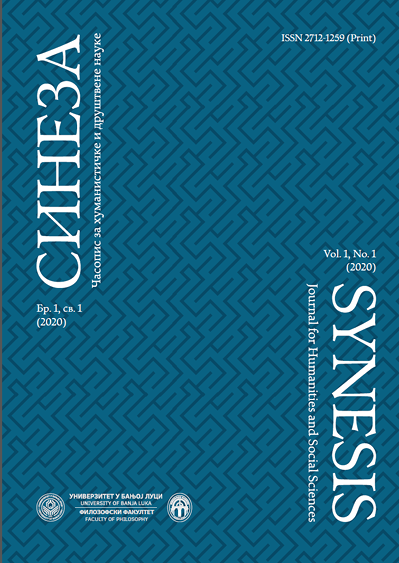
This paper focuses on analysis of mathematical being in Aristotle’s philosophy. In a brief introduction, the author endeavours to present the sources as well as the attitude of Greek thinkers towards mathematics, which is, for the first time in the history of European thought, treated as science, that is, knowledge that serves its own purpose. In addition, the author explicates Aristotle’s general attitude towards mathematics, which is followed by ontological analysis of mathematical being in next chapter. This analysis is extended in a representation of the relationship between the problem of universals and the determination of the nature of a mathematical object as an abstraction, thereby rendering it as the transparent relative way of existence of the mathematical being. Furthermore, the author presents Aristotle’s conception of space and time as values that are at the same time possibilities of abstraction of the mathematical being. After the process of abstraction, mathematical objects are observed through a cathegorical scheme, as they are in their ontological mode of being.
More...
This paper aims to analyse the fourth paradox from Cicero´s work Stoic Paradoxes (Cic. Parad. 27–32). In this text, Marcus Tullius Cicero tries to argue based on stoic-philosophical arguments that he did not leave into exile (in 58 BC). He rather implies that it was the Publius Clodius Pulcher who went into exile because of his loss of mental capacity. In Stoic Paradoxes author philosophically disputes his exile and because of moral dispositions, he achieves the positions of stoic sage as the highest ethical ideal.
More...
This article deals with different traditions of the genealogy of Pythagoras of Samos (c. 570–480 BC). It shows how three versions of Pythagoras’s lineage were combined in antiquity. Firstly, Pythagoras could be seen as the son of human parents who themselves descend from Ancaeus, the mythical founder and first king of Samos who is closely connected with both Greek and Near Eastern mythology. Secondly, there is the tradition that Pythagoras was the son of a human mother and Apollo, which goes together with the important role that this deity played in the religion of Pythagoreanism from the very start. Finally, the Pythagorean doctrine of metempsychosis holds another possibility in explaining Pythagoras’s genealogy that connects him directly with the shamanistic motif of the soul journey. A distinct analysis of the sources shows that the symbiosis of all three traditions was obviously the most common way of explaining Pythagoras’s genealogy.
More...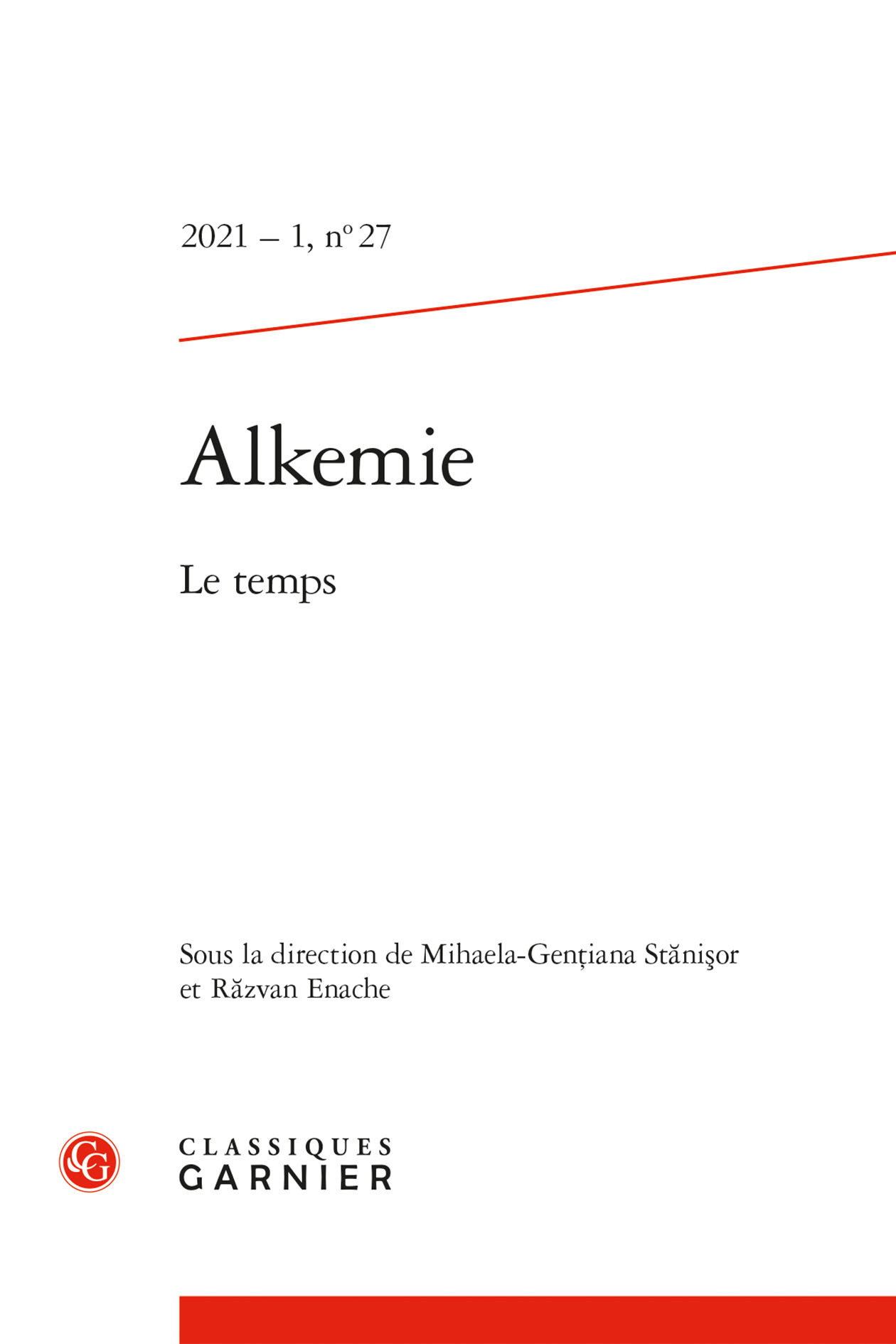
Ce texte envisage l’âme à partir de la question de son dépassement. Platon, Jan van Ruusbroec et Louis Lavelle pensent ce dépassement, non seulement comme une puissance qu’il appartient à l’âme d’actualiser mais aussi comme la condition de possibilité de son existence. À la fois source et horizon ultime de l’âme, ce mouvement de sortie invite à appréhender celle-ci dans sa rencontre concrète avec le monde sensible. This text aims to show how the soul can be considered from the question of its exceeding. Plato, Jan van Ruusbroec and Louis Lavelle think this movement of overcoming, not only as a potency but also as the condition of possibility of the existence of the soul. At the same time source and ultimate horizon of the soul, this movement of exit invites to apprehend this soul in its concrete meeting with the world.
More...
Cicéron nourrit une vision anthropologique du temps centrée sur la place de l’homme dans l’univers ainsi que ses rapports avec le temps de la nature. Le temps joue un rôle déterminant non seulement dans la réflexion, mais encore dans la structure même des dialogues cicéroniens qui suivent les traces de Socrate, qui avait fait descendre la philosophie du ciel sur la terre. Cicéron s’intéresse ainsi à la perception humaine du temps et aux changements qui affectent l’homme dans la durée. Cicero’s anthropological vision of time is based on a reflexive approach centered on man’s place in the universe and his relationship with nature’s time. Time nevertheless plays a determining role not only in the reflection, but also in the structure of the Ciceronian dialogues which follow in the footsteps of Socrates, who had descended the philosophy from heaven to earth. Cicero is interested in the human perception of time and in the changes which affect humans over time.
More...
Ciprian Vălcan propose une réflexion ironique sur la misanthropie, le suicide et la relation maître-disciple. Ciprian Vălcan proposes an ironic meditation on misanthropy, suicide and the relationship between master and disciple.
More...